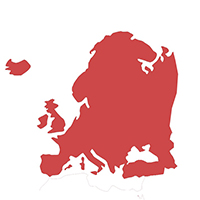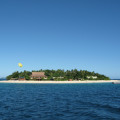Audacity and Ambition on Climate
Andres Fuentes | December 9, 2015.
Tony de Brum, foreign minister of the Marshall Islands, puts his position on climate negotiations bluntly: “I still refuse to go home from Paris without an agreement that allows me to look my grandchildren in the face, and say okay son, I’ve done a good thing for you.” And he’s not alone. Countries including the Marshall Islands and Saint Lucia have joined forces to create what’s being dubbed the “high ambition coalition.”
Todd Stern, U.S. special envoy for climate change, has been particularly vocal about the group, noting how representatives from Pacific and Caribbean islands have reached out to a number of countries to build this coalition.
Joining de Brum at a press conference was Saint Lucian Minister for Sustainable Development, James Fletcher, who outlined what his country wanted in an agreement out of the COP21 Paris summit:
- A pathway to survival for all countries, including limiting warming to 1.5°C,
- A long term decarbonisation goal and phasing out fossil fuel and carbon pollution by mid-century,
- Five year reviews to allow for the ratcheting up of ambition,
- Serious reckoning of the irreversible impacts of climate change – including loss and damage discussions, ocean acidification and loss of territory, and,
- A strong commitment and political reassurances of long-term finance.
The coalition’s work has been rewarded most prominently by bringing Australia on board with its 1.5°C target. It was able to broker a compromise between Saint Lucia, South Africa, and Australia that committed Australia to strongly supporting 1.5°C in exchange for carrying over of credits from the first Kyoto Protocol commitment period.
Four days later, the 28 countries that make up the European Union and 79 African, Caribbean and Pacific states, known as ACP, have announced they have joined forces.
Miguel Arias Cañete, the EU’s climate action and energy commissioner said the two groups have agreed that the Paris Agreement must:
- Be legally binding, inclusive, fair, ambitious, durable and dynamic,
- Set out a clear and operational long-term goal which is in line with science and limits warming to 2°C,
- Establish a review mechanism for countries to come together every five years to consider progress made and to enhance collective and individual efforts as appropriate, and,
- Include a transparency and accountability system to track progress on the delivery of national commitments and the sharing of best practice.
Cañete celebrated the joint position for a “very ambitious agreement.” This is not the first time these two groups have joined forces at the climate change negotiation; they also joined positions at the Durban negotiations in 2011.
Secretary-General of the ACP group of states, Patrick Gomes, also announced that the European Development Fund will allocate €475 million to support climate action, resilience building and environmental protection in ACP countries over the next five years.
Papua New Guinea Environment Minister John Thomas Pundari, who is also the chair of the Pacific Island Forum, emphasised that a 1.5°C target remains necessary for Pacific islands to survive, signalling some disagreement within the ACP.
“An emissions target of 1.5°C is very important to us. Any increase to that of the 1.5°C will be catastrophic for us in the Pacific region,” said Pundari. “And therefore we appeal and plead to all other nations represented here to help support the voice of the 1.5°C ambitions target.”
Responding to the statement by Pundari, Cañete added that, “we are working to find the language to accommodate 1.5°C within the agreement. I came from the group who is deciding on this and we are still talking on this.”
Patrick Gomes noted “the EU and the ACP Group represent a great majority of countries in the world” that want an “ambitious Paris Agreement to accelerate the global transition that we urgently need.”
“The adverse impacts of climate change threaten the world as a whole, including the very survival of the 79 countries of the ACP Group, while impeding their achievement of the Sustainable Development Goals,” said Gomes.
This high ambition coalition includes a large part of the G77+China negotiating bloc, but so far it seems as though China and India – two major polluters – are not a part of it. The US has at least been part of the discussions, if not a fully-fledged member of the coalition.







![Secretary-General Ban Ki-moon meets with Leaders from Small Island Developing States
[Secretary-General’s Conference room, Le Bourget]
- H.E. Mr. Anote Tong, President of Kiribati
- H.E. Mr. Christopher J. Loeak, President of Marshall Islands
- H.E. Mr. Freundel Stuart, Prime Minister of Barbados
- H.E. Mr. Kenny Davis Anthony, Prime Minister of Saint Lucia
- H.E. Mr. Enele Sosene Sopoaga, Prime Minister of Tuvalu](https://theverb.org/wp-content/uploads/2015/12/SG-Travel2-e1449660252704-120x120.jpg)





comment